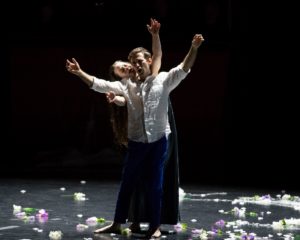
Rose Theater, Jazz at Lincoln Center 2018 Review – Orphic Moments: Matthew Aucoin‘s Cantata Enriches Orpheus Myth
By Jennifer PyronIn response to the increasing interest surrounding Matthew Aucoin’s “Orphic Moments,” the cast from National Sawdust in 2016 reformed this past week at the Rose Theater at Jazz at Lincoln Center. Additionally, MasterVoices was part of the performance in the new space. The 130 member chorus, which specializes in multiple genres of music, added not only an inspirational dimension of sound, but also a relatable display of human interaction and celebration.
At the National Sawdust performance, countertenor Anthony Roth Costanzo performed as Orpheus along with Kiera Duffy, as Euridice, and Lauren Snouffer, as Amore. Not knowing that his performance would spark a new interest in Gluck’s 1762 opera, Costanzo paved the way for Aucoin’s music to be experienced by more than just that audience and the cast vowed to perform together again.
In Rose Theater, the cast drew a greater audience and performed with gusto as Ted Sperling conducted. In order to better understand the entire performance, one had to keep the program open to clearly see how the opera was a combination of Gluck’s original 1762 score and Aucoin’s “Orphic Moments,” composed in 2014. The first break was in the middle of Act three that was labeled “The Orphic Moment,” and the second break followed after Act three that was also labeled “The Orphic Moment.” Combined, these “Orphic Moments” were used to tell the story behind Orpheus’ decision to ultimately lose Euridice for a second time to death.
Even with a basic understanding of the myth and Gluck’s traditional opera, no one could have prepared for what they would hear in Aucoin’s new cantata. “The Orpheus Myth is typically understood as a tragedy of humanity’s incapacity to overcome our basest, least rational instincts, even when another person’s life is at stake,” noted Aucoin in the program notes. In his “Orphic Moments,” Aucoin proved to be purely original and thought-provoking with his composition. Costanzo was organic, as the role of Orpheus has been a touchstone in the countertenor’s career. And when Aucoin specifically created a new cantata surrounding this role, it was Costanzo’s vocal technique and energy that inspired his creation.
The climax of the myth occurred when Orpheus was in Hades with Euridice and after being instructed not to turn and face her, he decided against this warning and therefore lost Euridice for a second time to death. One could see and feel the honest connection Aucoin had to Orpheus in this pivotal moment of the story. Instead of drawing from other composers, he created a shockingly vivid interpretation of his own. However, it felt out of place in the middle of Gluck’s score.
In order to better understand the reasoning behind Aucoin’s “Orphic Moments,” in comparison to Gluck’s score, it is necessary to pay attention to Aucoin’s inspiration. He intended to uncover the deepest parts of Orpheus’ psyche. Aucoin stated “perhaps Orpheus loses Euridice on purpose, or perhaps the instinct that he can’t overcome is the aesthetic impulse, the artist’s amoral attitude that art matters more than other human beings. I take this interpretation to an extreme in ‘The Orphic Moment,’ a ‘dramatic cantata’ which temporalizes and shines a magnifying glass on the instant before Orpheus turns around.”
Unfortunately, there were no subtitles at the Rose Theater for the cantata. However, the libretto proved to be Aucoin’s strongest force. At the start of “Orphic Moments,” Costanzo’s voice melted into waves of erotism as Keir GoGwilt played the violin. Costanzo articulated the text and added a visceral interpretation to each phrase.
“It has been life to lose you; It has been life to go without; And now can I go without; Going without you”
Costanzo’s voice and GoGwilt’s violin intertwined in the soaring high notes like an ethereal soundscape that floated above ostinatos in the orchestra. And at this moment, it was perfect timing for the solo dancer, Bobbi Jene Smith, to begin her interpretation of Euridice’s response.
As Euridice, played by Duffy, remained seated on stage, Smith and GoGwilt took over for her and the overall interaction was fueled by Orpheus as he toyed with the idea of losing her again.
“We met across a field; We met apart; And I thought this is life; thisdistance; You met the fresh electric air; The air my voice had woken; My voice which possessed you”
Costanzo’s voice was in perfect tonal placement, as he imitated the possession of Orpheus’ alter ego. One could not only hear, but see Costanzo lose himself in the moment and fearlessly portray his character. His entire body radiated with energy and force that left one astounded.


